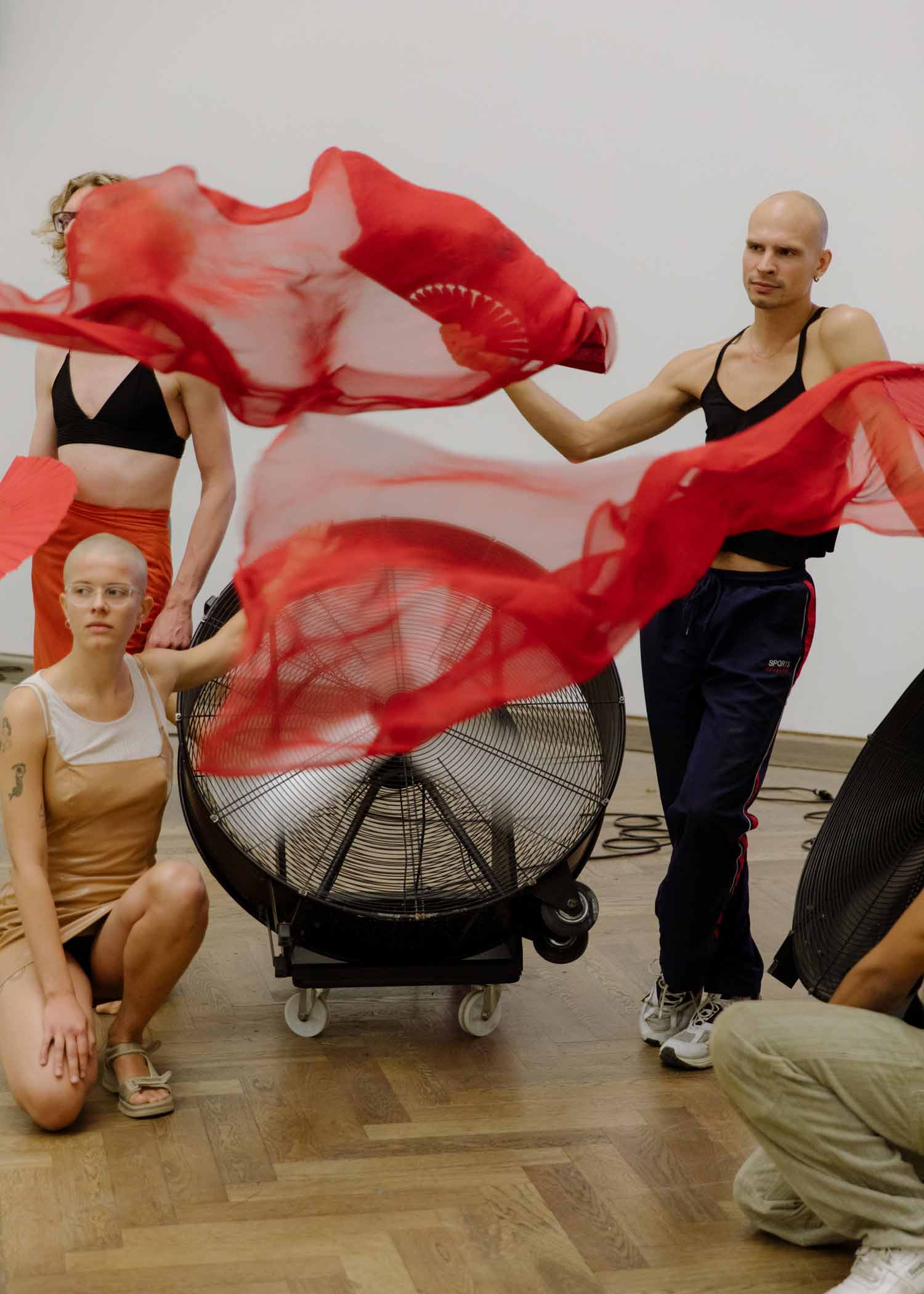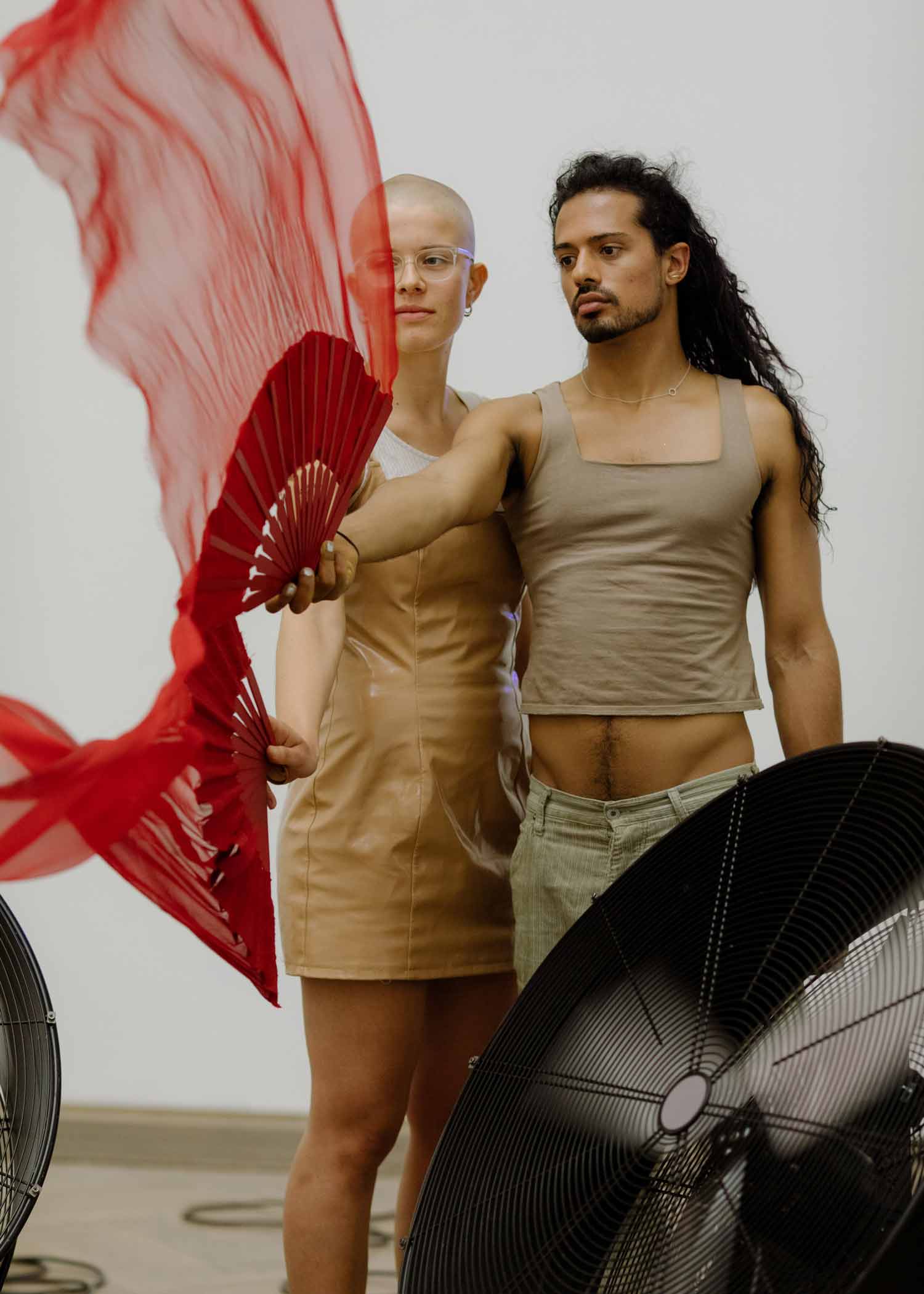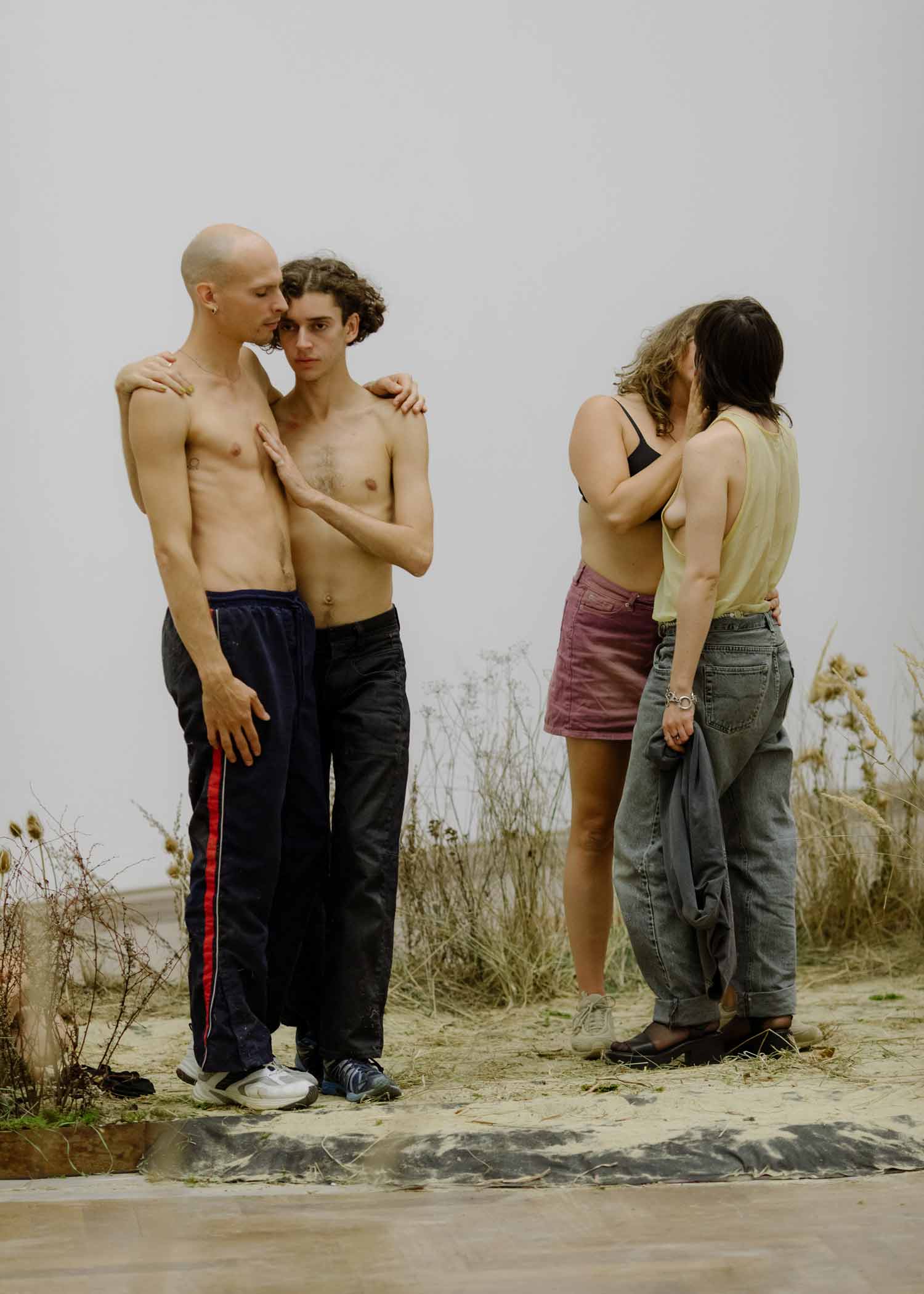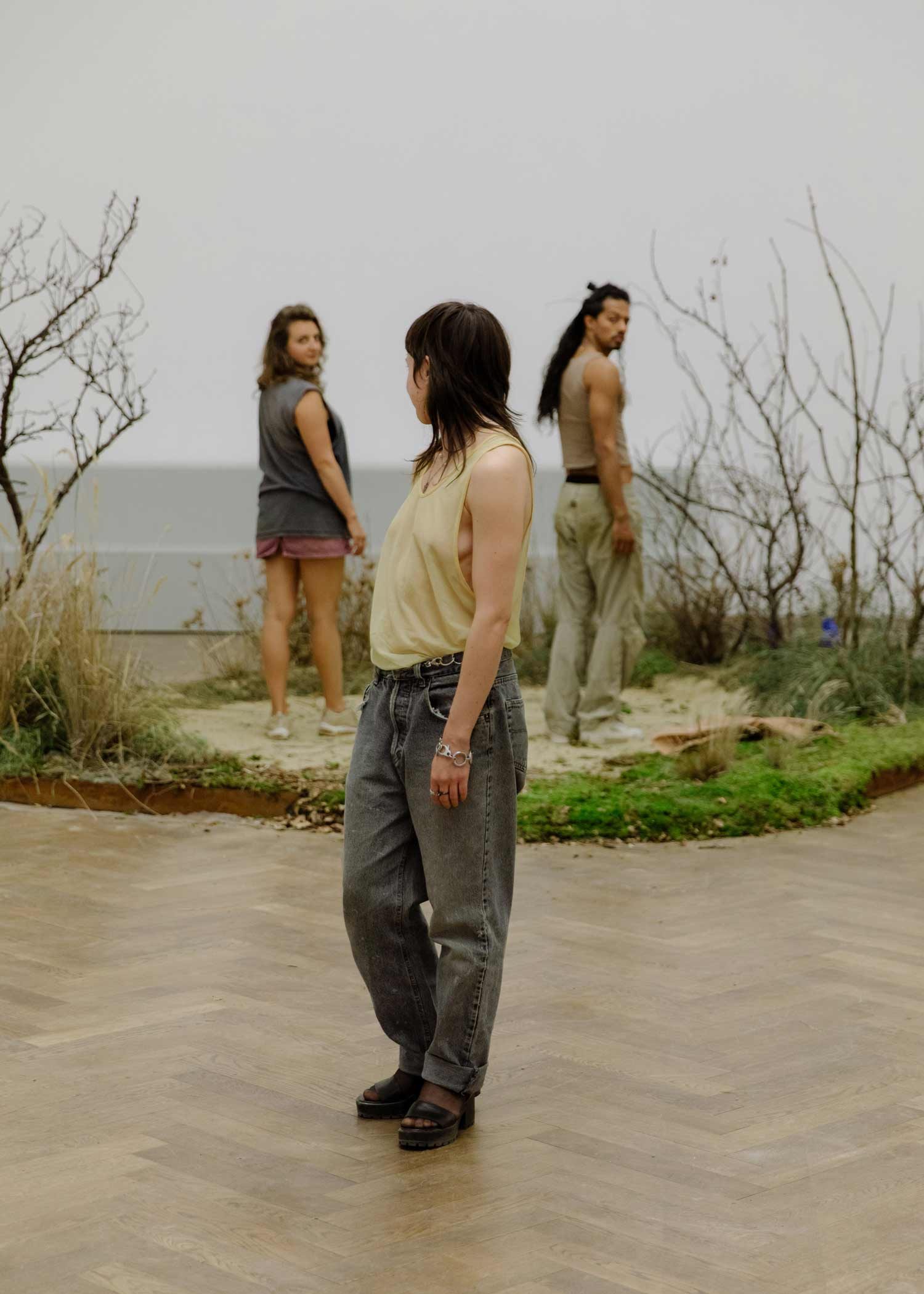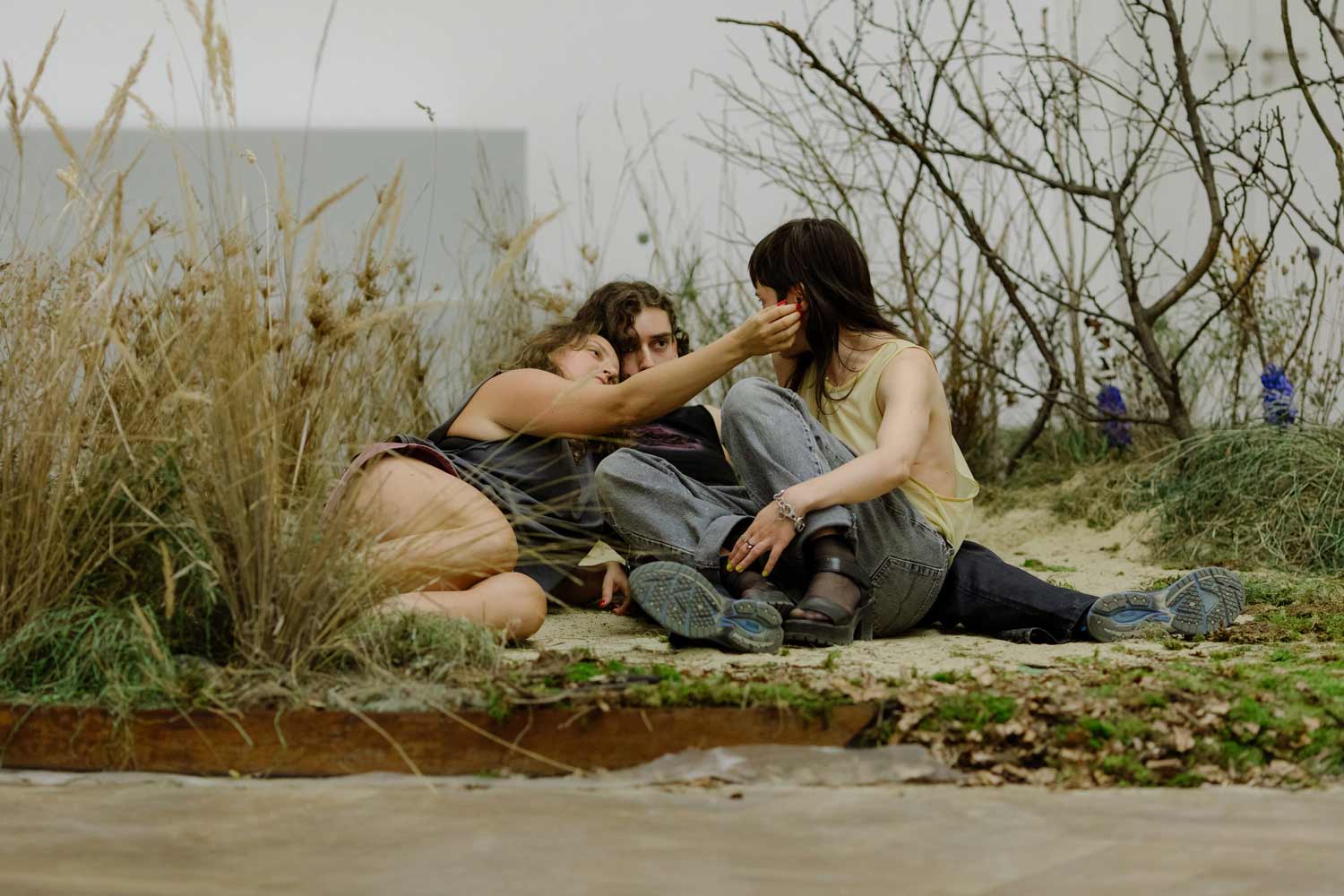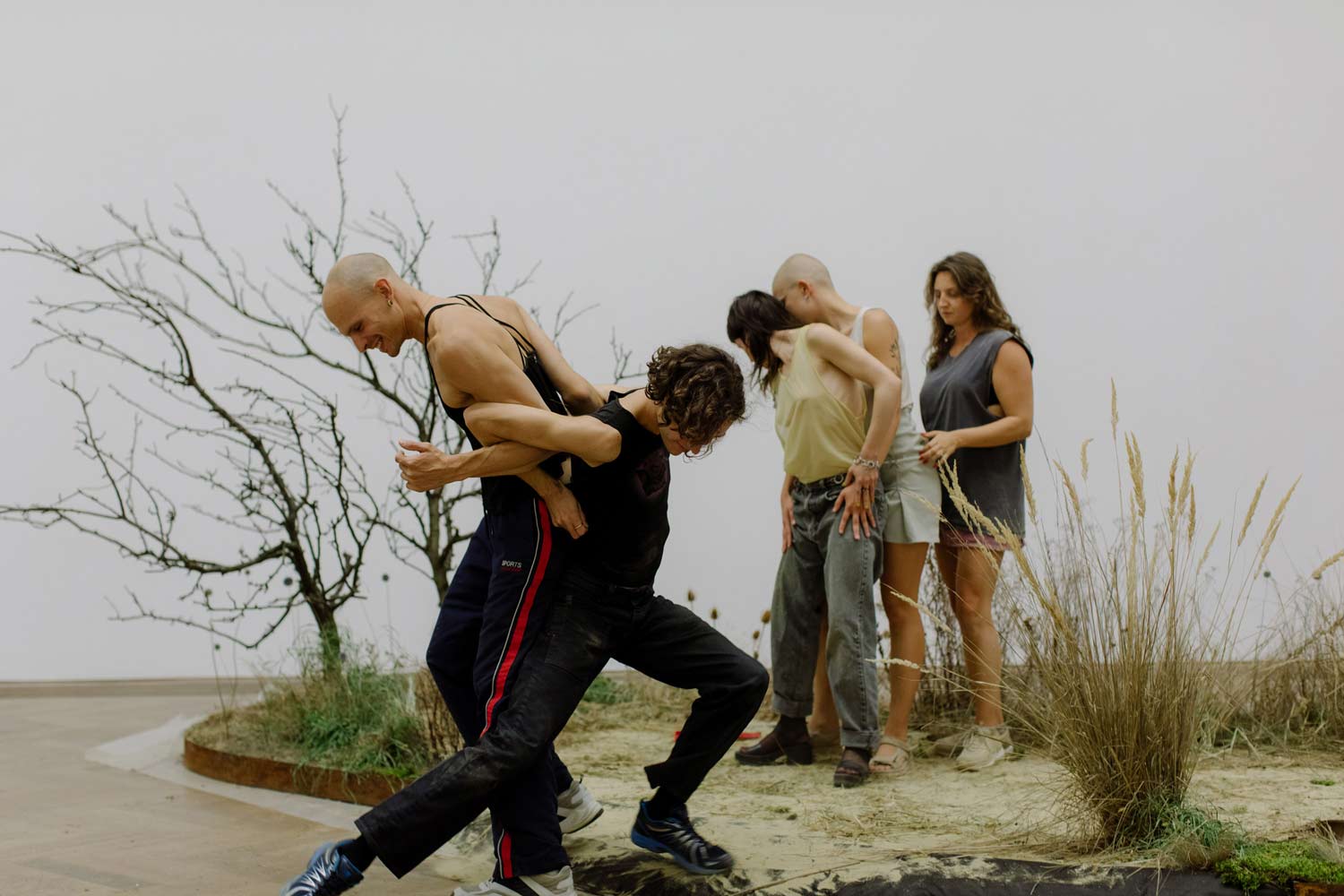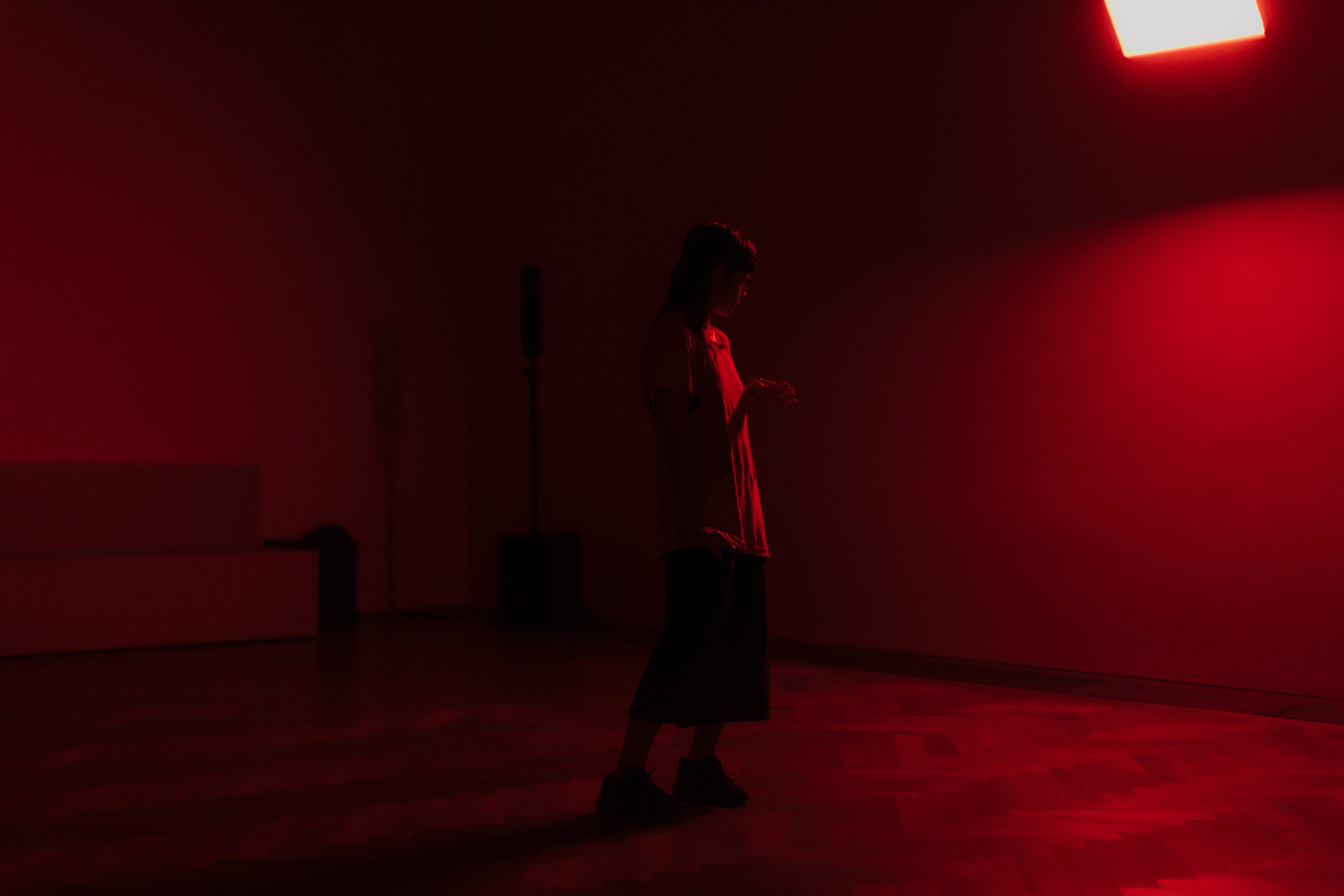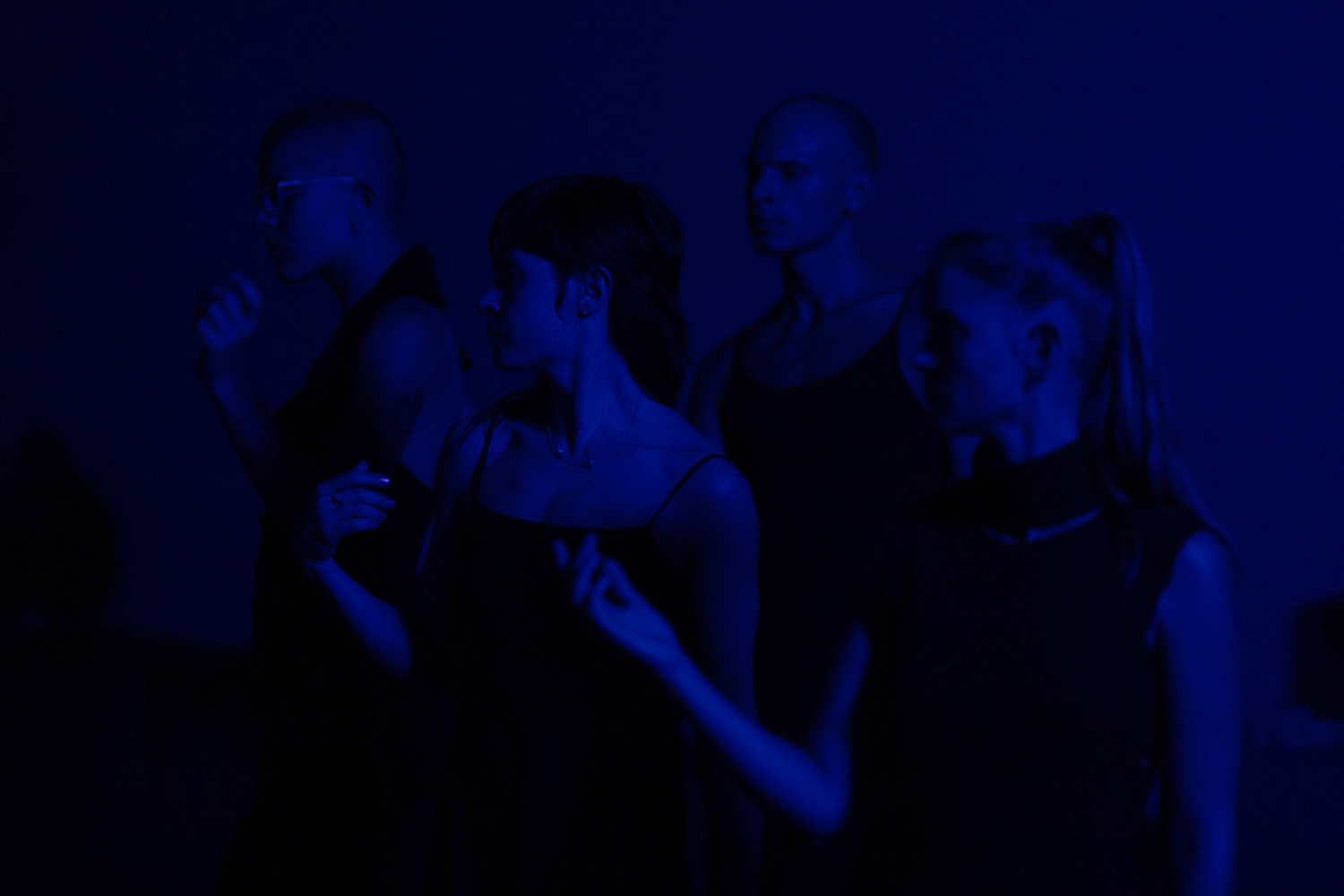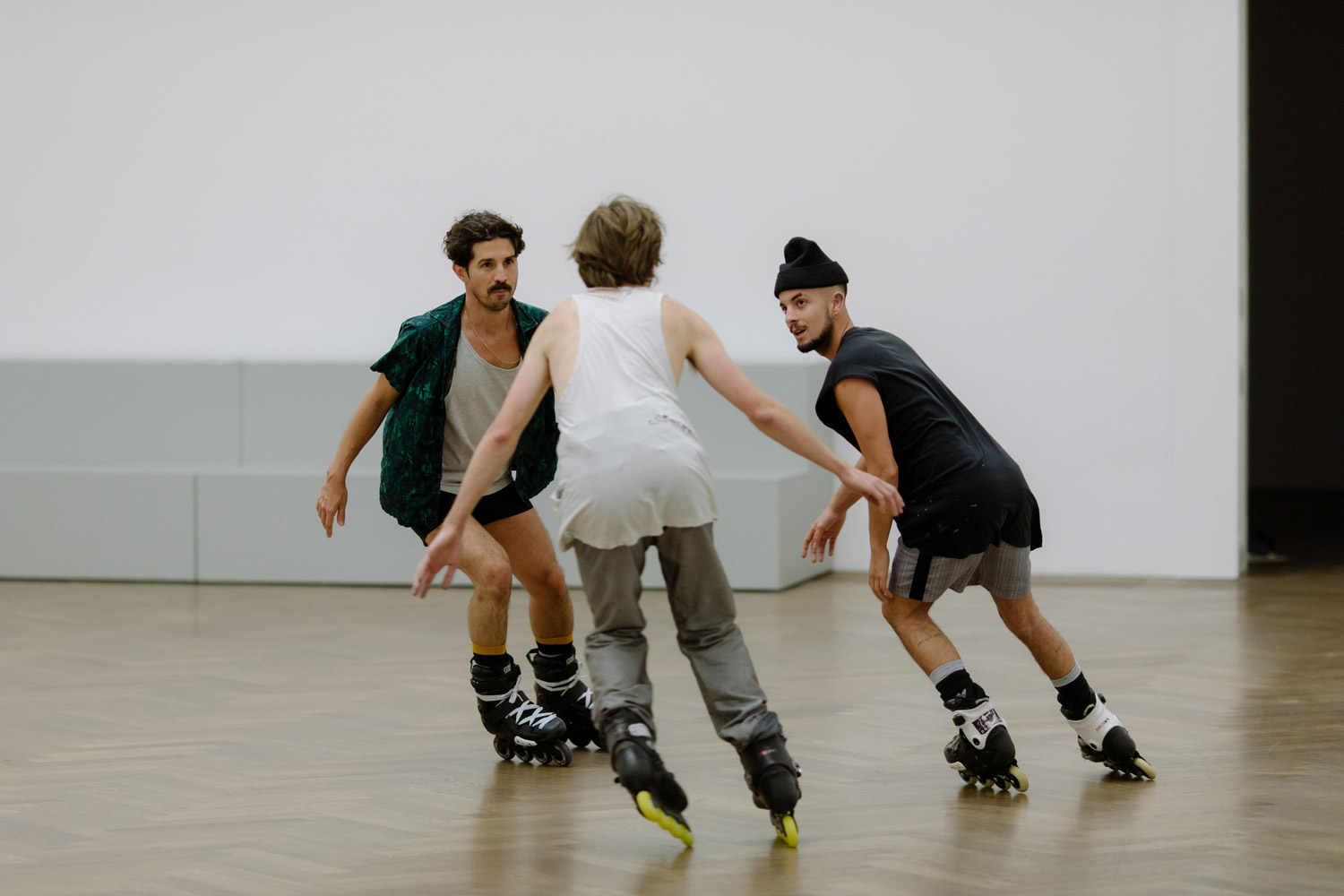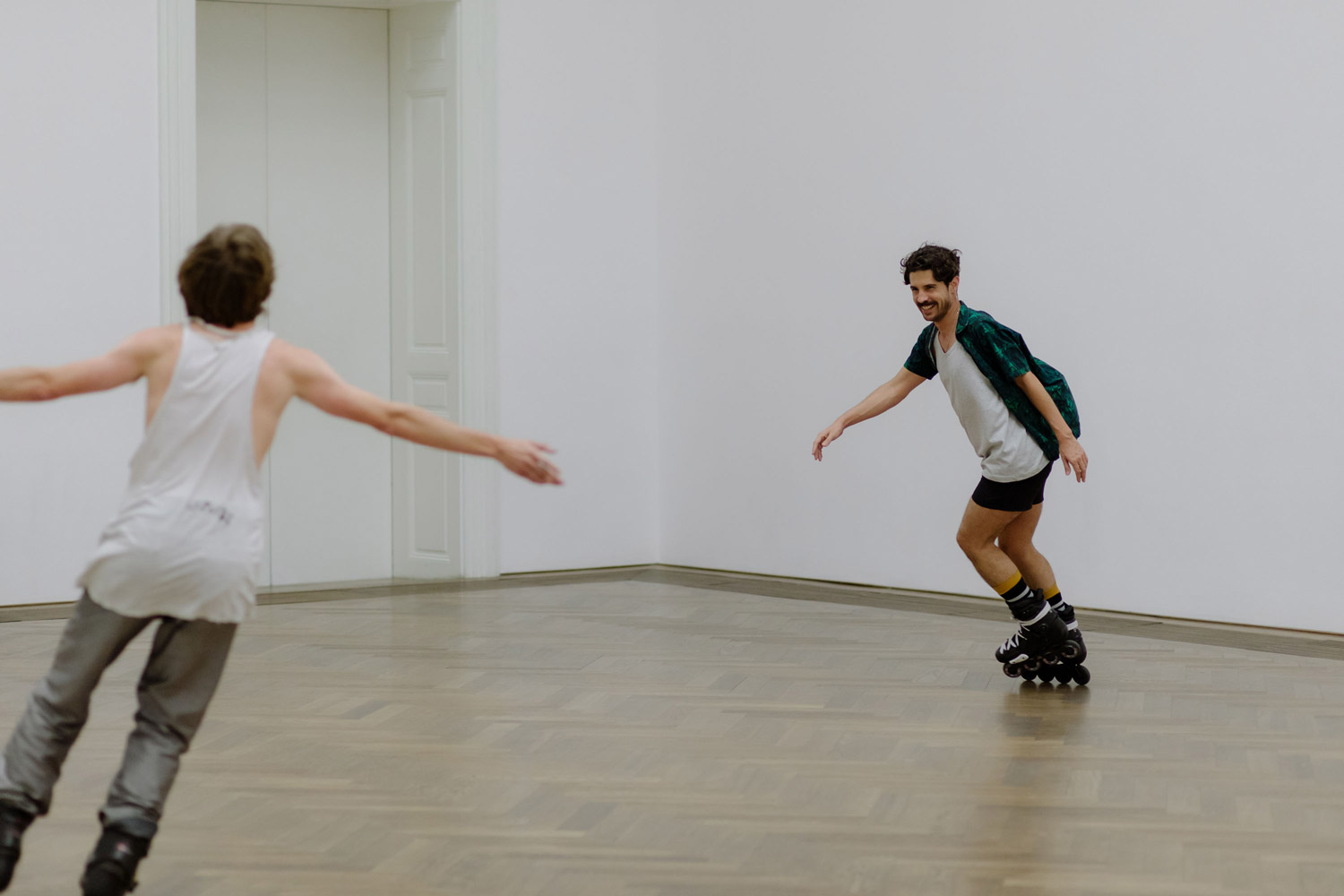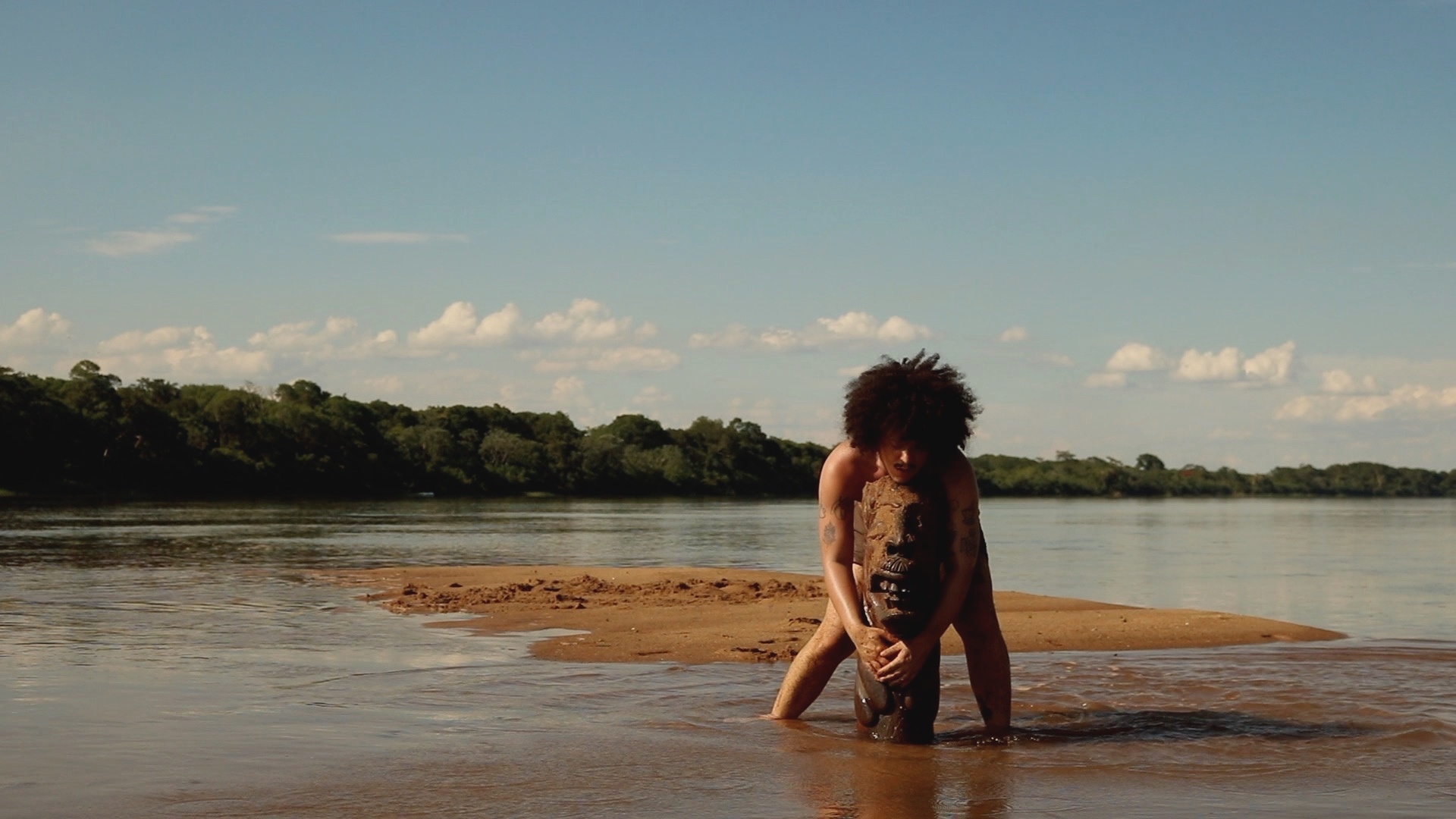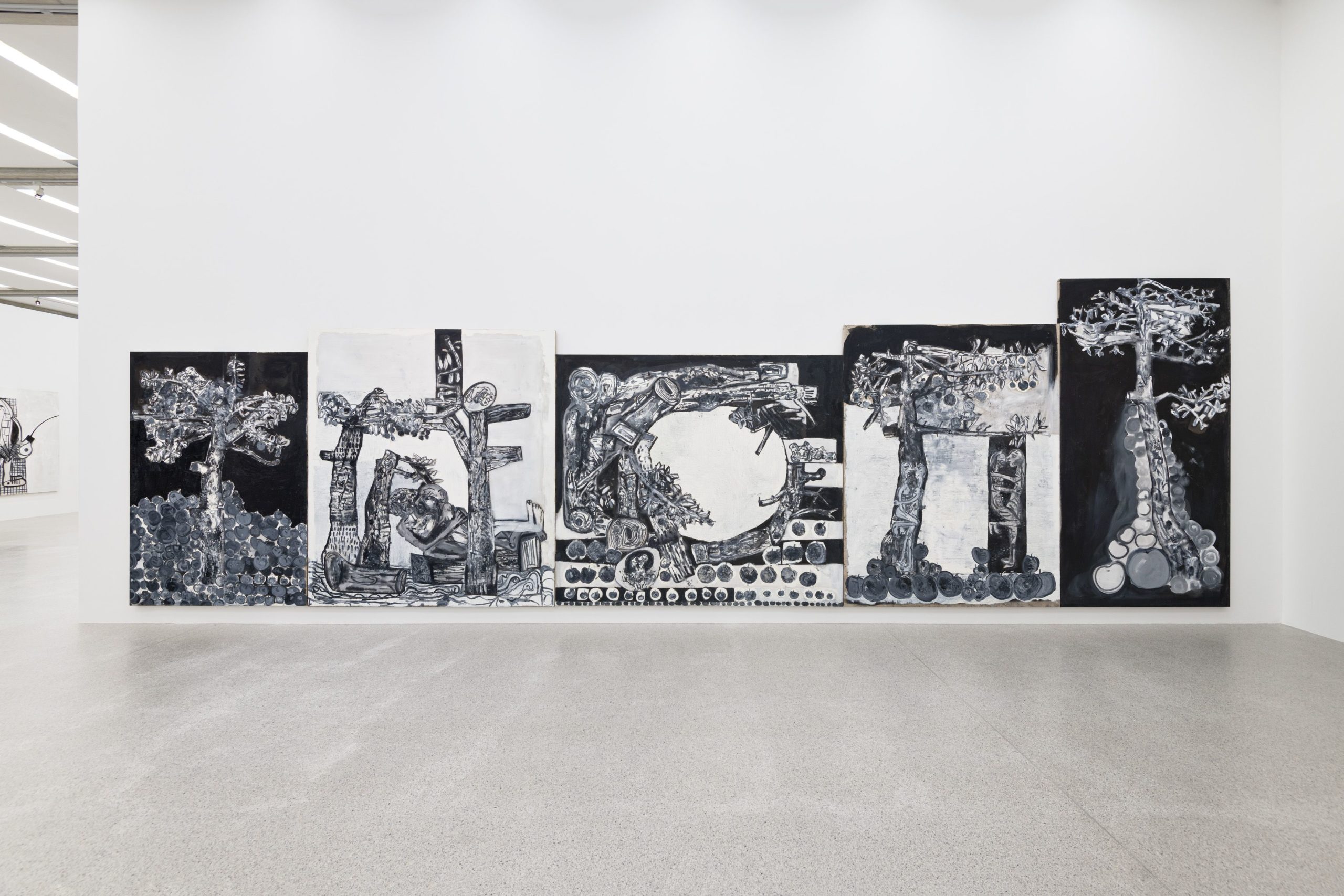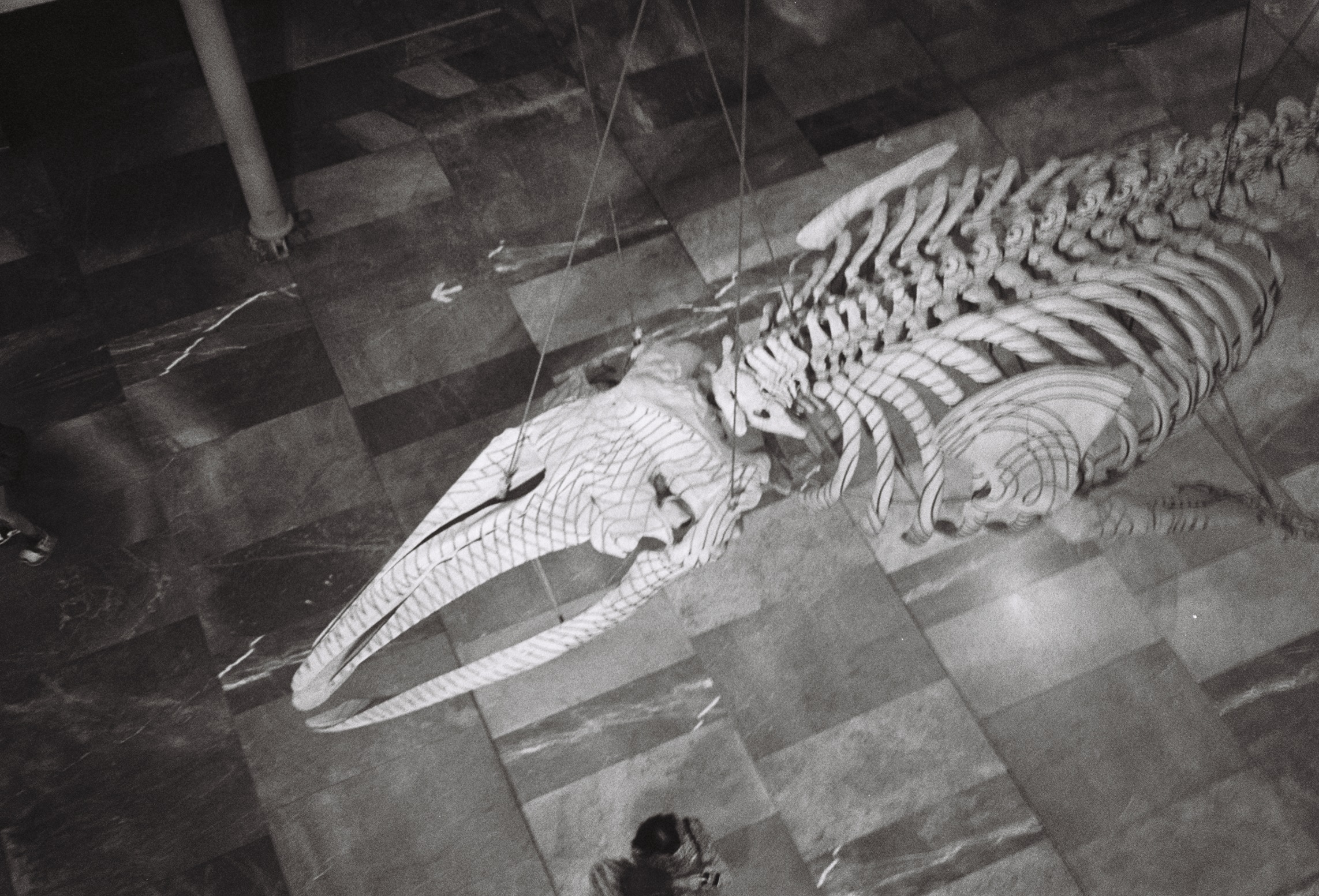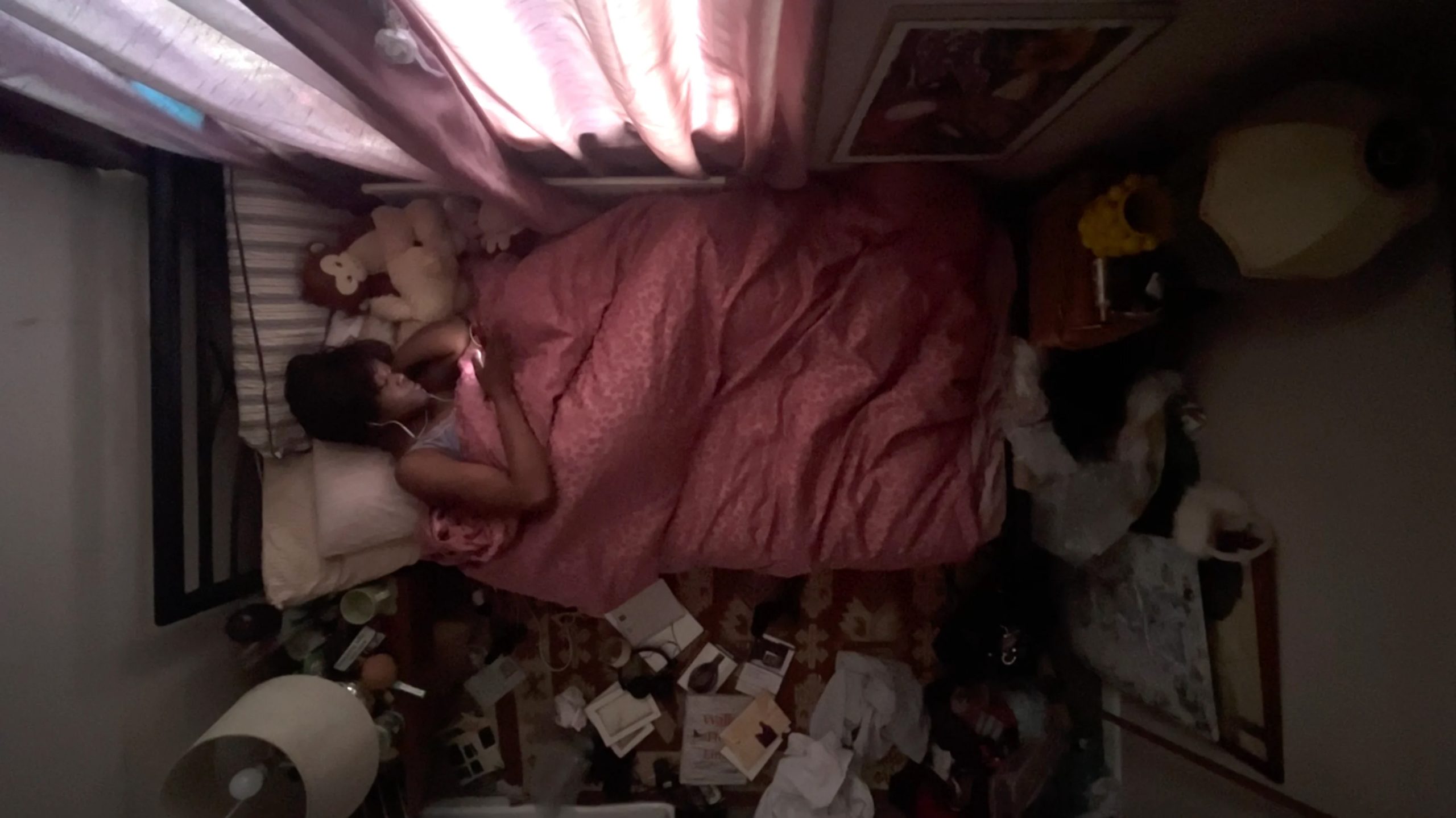At the center of Alex Baczyński-Jenkins’s Until a thousand roses bloom (with Warsaw in the background) (2018) are two plots of land dropped into Kunsthalle Basel. Both plots contain dried thistles and grasses set in sand and soil, interspersed with moss and blue hyacinths, with rough plastic sheeting protruding from the sides. These plants and materials recall the Plaża Romantyczna (the so-called “Romantic Beach”), a nudist and cruising spot just outside Warsaw on the River Vistula. Just as the beach is central to the performance, the river weaves itself through Baczyński-Jenkins’s debut film Faggots, Friends, and a Poem to the Nationalist Marcher (2019), which loops in the windowless stairwell through which you enter the gallery space.
Toward the start of the film, its three protagonists, Agata Grabowska, Billy Morgan, and Filip Rutkowski, dance in the mud of the river’s bank, drawing lines in the sand, demarcating space. Later, this landscape is filtered in pink, interspersed with a semi-constructed highway: an imminent threat to its life as a cruising spot. Filip then dances on the side of a boat travelling at speed down the Vistula. He wears a large bonnet fixed with a scarf and dips his iridescent heels in the sparkling water, shoes that are paraded and discarded throughout Until a thousand roses bloom. The Łazienkowski Bridge looms in the background of the shot, the place from which trans activist Milo Mazurkiewicz jumped to take their own life in early May 2019. At this point in the film, the stakes of Baczyński-Jenkins’s work are set: the mourning of queer lives lost, the mourning of queer lives impossible, and the construction of new modes of life that flourish in defiance.
Most of the film takes place in the rooms and gardens of a large 1930s villa planted between modernist blocks on the east side of Warsaw. Within this site, a queer militancy is enacted through the smallest of gestures. In one scene, Filip pretends to sow seeds in the garden while Billy pretends to rake the ground. Clothes are tried on, exchanged, switched. A balcony becomes a place for play smoking, like children imitating adulthood; an elegant living room becomes the site of a pretend game of cards. Playful experimentation continues through these demarcated spaces of intimacy. At one point, the trio finds a praying mantis in the garden. Agata and Filip hold it on their bodies, they dance with it. Later, they play with neglected objects in the garden: an unused car, an old wall, an abandoned piano. Within the walls of the garden, time is stretched, rendered safe and slow. In this world, it becomes necessary to learn again, outside the realms of straight socialization and violence, together and in the presence of others.
Here we see a utopian aspect to the garden and the plot of land. In its etymology, “paradise” comes from the Persian pairidaeza — a compound of pairi- (“in front of, near, against, around”) and -diz (“to make, to form a wall”) — referring to a walled garden. Paradise here is bounded, consistent with utopia’s history both within the straight and queer imaginary. For utopia to be imaginable, it must be somewhere separate, a place away from place, a non-place, no-where, located and separated: as islands, beaches, gardens. The purpose of Baczyński-Jenkins’s work is to fray these boundaries, to bring them into contestation. At different moments in the film, Billy, Agata, and Filip all read aloud Ezra Green’s “A Poem to the Nationalist Marcher (For the Queer People of Warsaw)” (2019), the eponymous title of the film. The lines “perhaps you have heard / this window is the aperture of prophecy” define the role of thresholds in the film.
At one point, Agata stands on the garden’s boundary wall and wonders if it might fall. Just as Derek Jarman’s garden at Dungeness folds into the land and sky, and the serrated plastic containing the plots peels into the gallery’s performance space, Agata’s dance on top of the wall tests the garden’s threshold. Other examples of frayed thresholds accumulate throughout the film: Billy opens a door and then sits in an open window; Filip opens the same door a number of times, each time in a different outfit; Agata welcomes the viewer through the main gate of a block of flats. “You are welcome inside,” the viewer is told. The question here is one of hospitality: who is welcomed into the boundaries of the house and under what conditions? For queers, the answer resounds: those who need it, those who need shelter from the world, those who wish to start to learn again, to pretend again, to sustain themselves in the most basic and most elaborate terms. “You are a guest now / in the house of my love,” the poem confirms.
Until a thousand roses bloom (with Warsaw in the background) was first performed at Foksal Gallery Foundation in the 2018 heat wave. “Foksal,” an intentional homonym with London’s Vauxhall, evokes the heterotopic Vauxhall Pleasure Gardens, the historical relic that gave way to gay clubs, saunas, and cruising grounds. Throughout the performance, the gardens become spaces for cycles of rest, seduction, and sex. From the Pleasure Garden to the Romantic Beach to the interior of the Kunsthalle. As the performers cruise, the audience is brought into the same orbit: voyeurs, participants, also waiting. Ernst Bloch’s ontology of the “not yet” (noch nicht) is enacted here via José Esteban Muñoz’s conception of queer life thrown into the future.
As it is to Muñoz and Bloch, waiting is central to Baczyński-Jenkins’s work. The performance is guided by a series of spiraling repetitions in the score. Krzysztof Baginski samples Urszula Sipińska’s romantic ballad Nim Zakwitnie Tysiąc Róż (Until a Thousand Roses Bloom, 1971), the lyrics of which roll on the wall across an LED screen, like subtitles at the opera. The performers form into groups, only to separate, their dynamics elastic. Their movements are slow, morphing and grinding into place through repetition and interaction. Glances are exchanged, lost. Just before the performers’ might kiss, they freeze, their eyes flicker. Intimacy is proximate but not yet possible. Every queer knows this. Growing up queer is a process of waiting: for the right people, the right place, the right historical conditions, the right moment. Hope is found in the enactment of repetition in its potential difference. Waiting is necessary, but so is its abolition, both personally and historically. The conservative tendency of Bloch’s utopian historiography is to keep waiting, to sacrifice the present to the future, for the horizon ahead. The queer revolutionary demand: to stop waiting, to undo the future by bringing it into the present.
In 1917, Bloch traveled to Switzerland to escape the draft of the Imperial German Army. While in exile he wrote a text, “On a Few Political Programs and Utopias in Switzerland” (1918). To Bloch, among many of his generation, Switzerland was a refuge, a shelter from the militarism and fascism of the wider continent. Whereas the first performance of Until a thousand roses bloom (with Warsaw in the background) overlooked downtown Warsaw, the windowless performance space of Kunsthalle Basel rendered Warsaw conspicuously absent. At the same time that the work addresses universal themes, it does it through the apertures of the current political situation in Poland. Switzerland, the displaced occupant of this work, brings this into focus, but it also brings new context: one that relates to the proximity of the nationalist marchers, who have long hounded those who need shelter: those inverts, aliens, and mutants for whom these performances become a site of shelter.
Throughout the film, images of the house and garden are intercut with scenes of a demonstration, footage from a LGBTQ+ Pride march that took place in the eastern city of Białystok on July 20, 2019. A thousand queer marchers occupy the main streets of the city, flanked by lines of riot cops and around four thousand counterdemonstrators: nationalists, fascists, queerphobes. Militant politics traditionally identifies the street as a prime site of struggle. In the film this is affirmed: through the occupation of space, the enactment of collective joy, through music and dance and resistance to misogynistic violence. In one scene, an explosion can be heard: the crowd panics, some smoke raises, a man appears out of the smoke threatening a group of people. On the streets the faggots and their friends protect each another.
But the film also shows a private space, where the smallest of gestures enacts a militant resistance, a place and time of intimacy with others. As Lisa Robertson puts it in her essay “Thresholds: A Prosody of Citizenship” (2018), private space represents not a wasteland of the political but a place in which a subject forms in both language and somatics, where the “time of the body is generative, commingled, gestural, enacted.” At one point in the film, Agata Grabowska tears out clippings from homophobic newspapers at the time of the march. She arranges them on a table in a kitchen, mixes water with flour, and constructs a papier-mâché bonnet with the clippings. The hat is left on a windowsill to dry. Later, she returns to the window to try it on, tying it on with a bow, as Filip did on the boat earlier. The frame jumps to the march where she wears the bonnet, adjusting it with the scarf. To experience Until a thousand roses bloom (with Warsaw in the background) and Faggots, Friends, and a Poem to the Nationalist Marcher is to be reminded not only of the current threats to queer life but to glimpse — as a prophecy — a life not yet fully lived and not yet fully known. The point is to wait for the sake of those no longer present, while refusing to wait as long as they had to.

